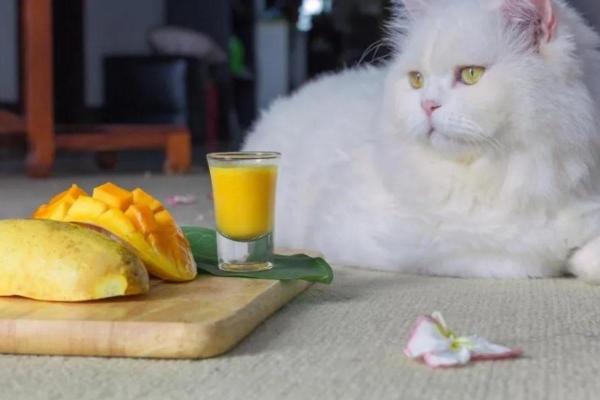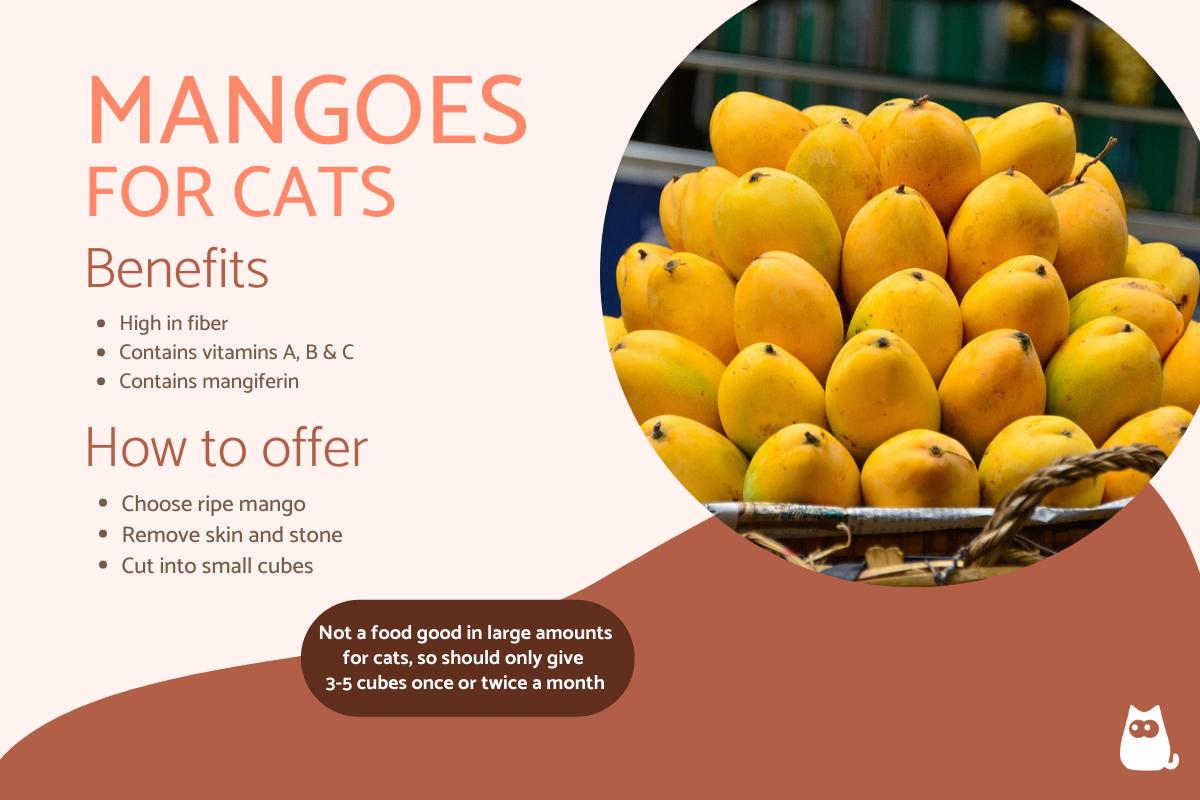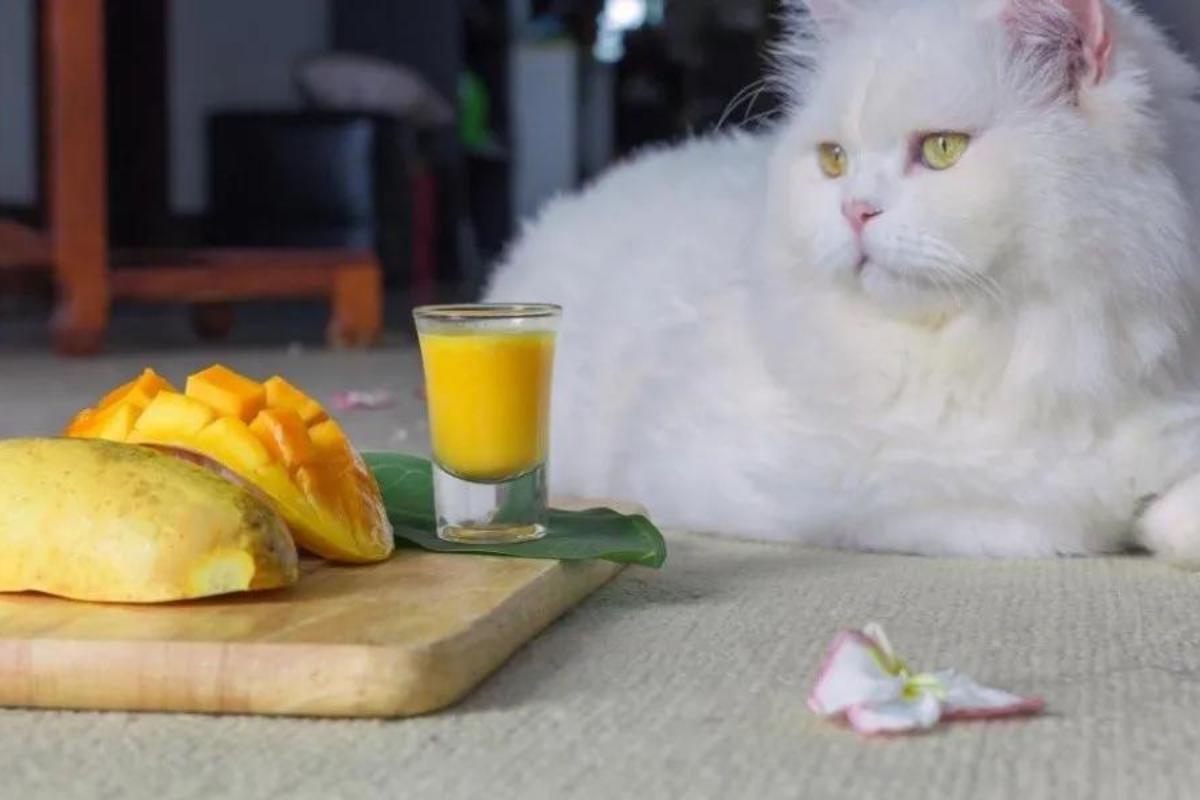Can Cats Eat Mango?



See files for Cats
Although the mango was first cultivated around 5,000 years ago in Southeast Asia, it is now grown almost anywhere in the world with a suitably warm or tropical climate. When we factor in importation and commercial greenhouses, mangoes are pretty much available everywhere. Their nutritional benefits are incredible, but they are perhaps most valued for their exquisite taste. Their sweetness, juiciness and tropical flavors make those who eat them think of sunny climes with just a bite. Such evocative and tropical flavors are not commonly seen in commercial cat food. Felines are not particularly known for having a sweet tooth. This may lead us to ask can cats eat mango? AnimalWised finds out if there is any harm or benefit in doing so.
Is mango good for cats?
When giving any new food to a cat, the first thing we need to consider is its toxicity. For this reason, we need to know whether mangoes are poisonous for cats. Many foods which are delicious and nutritious for humans contain compounds which are toxic to cats, especially in large doses. Fortunately, mangoes are not toxic for cats.
Although not toxic, mangoes are necessarily good for cats. This is due to a cat's type of diet and required nutrition. Unlike dogs, cats are obligate carnivores. This means they must have a diet based on the consumption of animal protein, even if they can tolerate eating other foods in limited quantities. Generally speaking, cats should not have fruit as part of their diet since the majority of their nutrition is sugars and other carbohydrates.
Mango in particular is not a fruit recommended for cats specifically because of its high sugar content. Sugar not only does not provide benefit to cats, its consumption in high doses can cause harm by damaging the kidneys or influencing the development of diabetes in cats. Mango has double the sugar of other fruits which are known for being sweet. For example, it has 14 g sugar per 100 g in comparison to strawberries which have 6-7 g.
Taking the above into account, although cats can eat mango, it is not a fruit that should be included in the diet of these animals. If they eat a small amount every once in a while, it shouldn't do them any harm. Fortunately, the sweetness will mean many cats will not have much interest in eating mango in the first place. This will depend on the individual, as some may enjoy it.

Benefits of mango for cats
As we have seen, mango is not a recommended fruit for cats. Although its contribution has certain drawbacks, there are some nutritional benefits which may be provided. We can find these out by looking at the nutritional benefits of mangoes:
- It is a source of fiber: favors intestinal transit, improves the quality of feces and contributes to the maintenance of beneficial intestinal microbiota.
- It is a source of vitamins: specifically, it provides considerable levels of vitamin A, vitamin B9 (folic acid) and vitamin C, in turn protecting cells by protecting against free radicals. Mangoes contain beta-carotene, antioxidant compounds that are transformed into vitamin A in the body.
- Contains mangiferin: it is a polyphenolic compound that may have potential in protecting against UV rays and even has potential anti-cancer properties. However, little research has been carried out on cats and there is not yet conclusive evidence to prove its uses.
Although mango is not a fruit which should be given to cats regularly, it can be good for cats in small doses. Learn what other foods fit into this category by looking at our guide to fruits and vegetables suitable for cats.
How to give mango to a cat
As we have mentioned, mango is not a food that should be part of the regular diet of cats. If you notice that your cat shows a special interest in this fruit, you can choose to offer it as an occasional reward or treat. A good option may be to use it as an alternative to commercial treats.
Before offering mango to your cat, it is important that you prepare it safely by following the steps below:
- Select a mango that is sufficiently ripe.
- Peel the skin and remove the stone from the center. The skin and stone of the mango should never be given to cats since their composition is toxic to cats. These elements also pose a risk of choking and can cause injuries to the oral mucosa and obstructions in the stomach or intestinal tract.
- Once you have separated the pulp from the mango, cut it into small cubes approximately half a centimeter each.
Learn more about sharing your food with your feline by looking at what human foods cats can eat.
How much mango to give to a cat
If you finally decide to include mango in your cat's diet, remember that you should only offer it in small amounts and only do so occasionally. In an adult cat, you can add 3-5 cubes of mango, a couple of times a month. Providing an excessive amount or offering it too frequently can cause some unwanted effects on your cat's health, which we discuss in more depth in the next section.
Learn more about exotic fruits for cats with our article which asks can cats eat avocado?
Side effects of mango for cats
Although the flesh of mango does not contain any compounds that are toxic to cats, they can cause significant harm to their health when eaten in excessive amounts. We can see this by looking at the negative effects of mango for cats:
- Obesity: mango is a fruit with a relatively high energy value, which is why its contribution can influence the appearance of obesity in cats, especially when neutered, elderly or sedentary.
- Nutritional imbalances: as we have seen, cats are obligate carnivores that must have a diet based on the consumption of foods of animal origin. An excessive intake of fruit can cause significant nutritional imbalances, with protein deficits, electrolyte imbalances, etc.
- Choking or suffocation: when the portion is offered with fragments of skin or stone.
- Digestive problems: providing the mango stone can cause significant problems in the digestive tract, such as ulcers in the oral or gastrointestinal mucosa, fractures of dental pieces and gastric or intestinal obstructions.
Contraindications of mango for cats
There are certain situations in which the consumption of mango can be especially counterproductive. The following cats need to avoid mango consumption:
- Overweight or obese cats
- Cats with allergies or food intolerances
- Cats with gastrointestinal problems
Gastrointestinal problems in cats can be acute or chronic, but mango should not be given in either case. This means they cannot eat mango if the cats has vomiting and diarrhea, inflammatory bowel disease (IBD), gastrointestinal lymphoma and other GI issues.
Whenever you introduce any new food into your cat's diet, it is important that you monitor the appearance of possible adverse reactions in the hours after its consumption. Now you know whether cats can eat mango, you may be interested in the suitability of other foods for felines such as whether cats can eat raw eggs.

If you want to read similar articles to Can Cats Eat Mango?, we recommend you visit our Homemade diets category.
- Spanish Federation of Nutrition. (2018). Status report on fruit and vegetables: nutrition and health in Spain in the 21st century.






